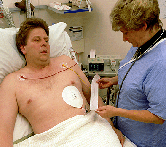Chemo Drug Improves Stomach Cancer Survival for Japanese Patients
Researchers aren't sure if drug would have same benefit for Caucasians.
By Ed Edelson
HealthDay Reporter
|
E-mail this article
Subscribe to news
Printer friendly version
|

(SOURCES: Manish Shah, M.D., assistant attending oncologist, Memorial Sloan-Kettering Cancer Center, New York City; Jaffer Ajani, M.D., professor of medicine, University of Texas M.D. Anderson Cancer Center, Houston; Nov. 1, 2007, New England Journal of Medicine)
WEDNESDAY, Oct. 31 (HealthDay News) -- Treatment of stomach cancer with an experimental chemotherapy drug after surgery improved survival rates for Japanese patients, a new study found.
The results of the trial won't mean much for Americans with stomach cancer, because the drug, designated S-1, is classified as "investigational" in the United States. But the study results could add impetus to the use of drug and/or radiation therapy against stomach cancer, U.S. experts said.
"This is the third large study that demonstrates a significant benefit of adjuvant (combination) therapy either before or after surgery for gastric cancer," said Dr. Manish Shah, an assistant attending oncologist at Memorial Sloan-Kettering Cancer Center in New York City.
Until relatively recently, it had generally been thought that drug or radiation therapy for stomach cancer wouldn't accomplish much, Shah said. "With less than one-year survival with metastatic disease, there may have been a sense that it didn't do any good," he said.
Metastatic means that the gastric cancer has spread outside the stomach, establishing microscopic colonies beyond the reach of surgery. But the almost 1,060 participants in the Japanese trial were potentially curable with surgery, because the disease had not spread. Half were assigned S-1 treatment plus surgery, while the other half had surgery followed by observation alone.
The trial, scheduled to last three years, was stopped after 12 months, because the survival rate for the S-1 group was 80.1 percent, compared to 70.1 percent for the surgery-only group.
The findings are published in the Nov. 1 issue of the New England Journal of Medicine.
S-1 had been used in some U.S. trials but was abandoned because of the high rate of side effects, Shah said. Japanese people apparently metabolize the drug differently than Caucasians, minimizing its side effects, he said.
Other drugs are being used successfully against stomach cancer, as is radiation, said Dr. Jaffer Ajani, professor of medicine at the University of Texas M.D. Anderson Cancer Center in Houston. But surgery is the essential first step in treatment of stomach cancer, he said.
"Chemotherapy alone has never been shown to be beneficial," Ajani said.
The U.S. National Cancer Institute estimates that there are 21,260 new cases of stomach cancer among Americans each year, with 11,210 deaths.
"Treatment for my patients includes radiation and chemotherapy together," Ajani said. "Not for every patient, but for most patients."
Use of such adjuvant therapy for stomach cancer began slowly, with studies showing that "chemotherapy was better than not for patients with metastatic disease," Shah said. Later trials showed benefits for people whose cancers had not spread.
"For gastric cancer, since 2001, some kind of adjuvant therapy has been given here in the United States, along with radiation," Shah said.
More information
Complete information on stomach cancer is available from the U.S. National Cancer Institute.
Copyright © 2007 ScoutNews, LLC. All rights reserved. 
HealthDayNews articles are derived from various sources and do not reflect federal policy. healthfinder.gov does not endorse opinions, products, or services that may appear in news stories. For more information on health topics in the news, visit the healthfinder.gov health library.